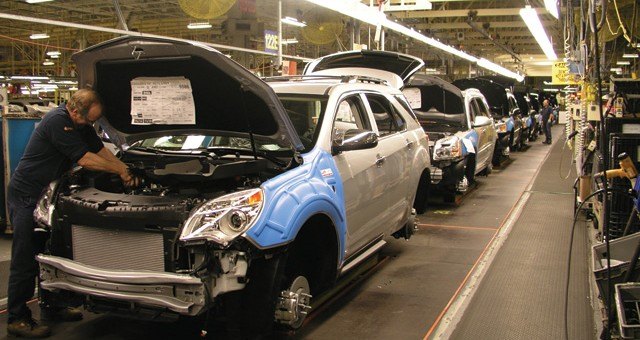General Motors Employees Authorize Strike in Ontario, Start Countdown

Unifor Local 88 just loaded its strike gun. Workers at General Motors’ Ingersoll, Ontario, assembly plant voted on Sunday to enact a strike if no labor agreement can be reached by next month. The union, which represents the CAMI factory employees, said 99.8 percent of workers at the plant voted for the strike authorization.
Negotiations started in July as GM announced it would lay off about 400 Ingersoll-based workers — resulting from the automaker’s previous decision to shift production of the GMC Terrain to Mexico. Unifor estimates roughly 200 workers took early retirement packages earlier this year.
About 2,450 hourly workers will be employed at the plant following the layoffs, as well as about 300 salaried workers. Now, the strike vote threatens the sole remaining model produced in Ingersoll — a strategically important one for GM.
Workers at the CAMI facility began producing the 2018 Chevrolet Equinox in January. The newly downsized crossover competes in what is perhaps the hottest automotive segment, facing massive competition from every other automaker.
“The membership took an important step today to support the Bargaining Committee,” Unifor Local 88 President Dan Borthwick said in an official statement. “The vote today sends a clear message to GM that the members stand behind the bargaining committee and the proposals that Unifor Local 88 put forward on behalf of the membership.”
In an earlier interview with CTV News, Borthwick also expressed his concerns for the well-being of the small town. “We’re going through a tough time,” he said. “[The layoffs] are a blow to our plant and the community of Ingersoll.”
Speaking with Automotive News earlier this month, Unifor President Jerry Dias said the union’s top priority in its negotiations with GM was to secure jobs for the laid off workers. However, Union leaders have also said the bargaining committee will not accept any deals without the company addressing shop floor issues, improved wages with benefits, and new investment at the plant to replace the Terrain.
“GM has done very well in the four years since the last round of negotiations, with both shareholders and executives profiting,” Mike Van Boekel, chair for Local 88, said in an earlier statement. “At the GM Cami facility they have made more than $2 billion per year. It’s time for the workers to be rewarded.”
Boekel added that workers have been on mandatory overtime, working six days a week, since 2009, meeting all production and quality targets of the Chevrolet Equinox crossover. “The current corporate practice of whipsawing one plant against another, one country against another, must stop,” he said.
GM Canada concluded talks with its other Unifor plants in September of 2016. Those workers received pay increases, a higher starting wage for new hires, and a signing bonus. It also pledged a new vehicle for its Oshawa assembly plant, and made 700 temporary jobs permanent.
[Images: General Motors]

A staunch consumer advocate tracking industry trends and regulation. Before joining TTAC, Matt spent a decade working for marketing and research firms based in NYC. Clients included several of the world’s largest automakers, global tire brands, and aftermarket part suppliers. Dissatisfied with the corporate world and resentful of having to wear suits everyday, he pivoted to writing about cars. Since then, that man has become an ardent supporter of the right-to-repair movement, been interviewed on the auto industry by national radio broadcasts, driven more rental cars than anyone ever should, participated in amateur rallying events, and received the requisite minimum training as sanctioned by the SCCA. Handy with a wrench, Matt grew up surrounded by Detroit auto workers and managed to get a pizza delivery job before he was legally eligible. He later found himself driving box trucks through Manhattan, guaranteeing future sympathy for actual truckers. He continues to conduct research pertaining to the automotive sector as an independent contractor and has since moved back to his native Michigan, closer to where the cars are born. A contrarian, Matt claims to prefer understeer — stating that front and all-wheel drive vehicles cater best to his driving style.
More by Matt Posky
Latest Car Reviews
Read moreLatest Product Reviews
Read moreRecent Comments
- Golden2husky The biggest hurdle for us would be the lack of a good charging network for road tripping as we are at the point in our lives that we will be traveling quite a bit. I'd rather pay more for longer range so the cheaper models would probably not make the cut. Improve the charging infrastructure and I'm certainly going to give one a try. This is more important that a lowish entry price IMHO.
- Add Lightness I have nothing against paying more to get quality (think Toyota vs Chryco) but hate all the silly, non-mandated 'stuff' that automakers load onto cars based on what non-gearhead focus groups tell them they need to have in a car. I blame focus groups for automatic everything and double drivetrains (AWD) that really never gets used 98% of the time. The other 2% of the time, one goes looking for a place to need it to rationanalize the purchase.
- Ger65691276 I would never buy an electric car never in my lifetime I will gas is my way of going electric is not green email
- GregLocock Not as my primary vehicle no, although like all the rich people who are currently subsidised by poor people, I'd buy one as a runabout for town.
- Jalop1991 is this anything like a cheap high end German car?



































Comments
Join the conversation
Reading the comments on this thread and the Texas Flood thread makes my avatar look like the correct choice once again.
And yet Unifor and UAW wonder why millions of us shop non-union exclusively. There's too many high-quality products available to support their bullshit.